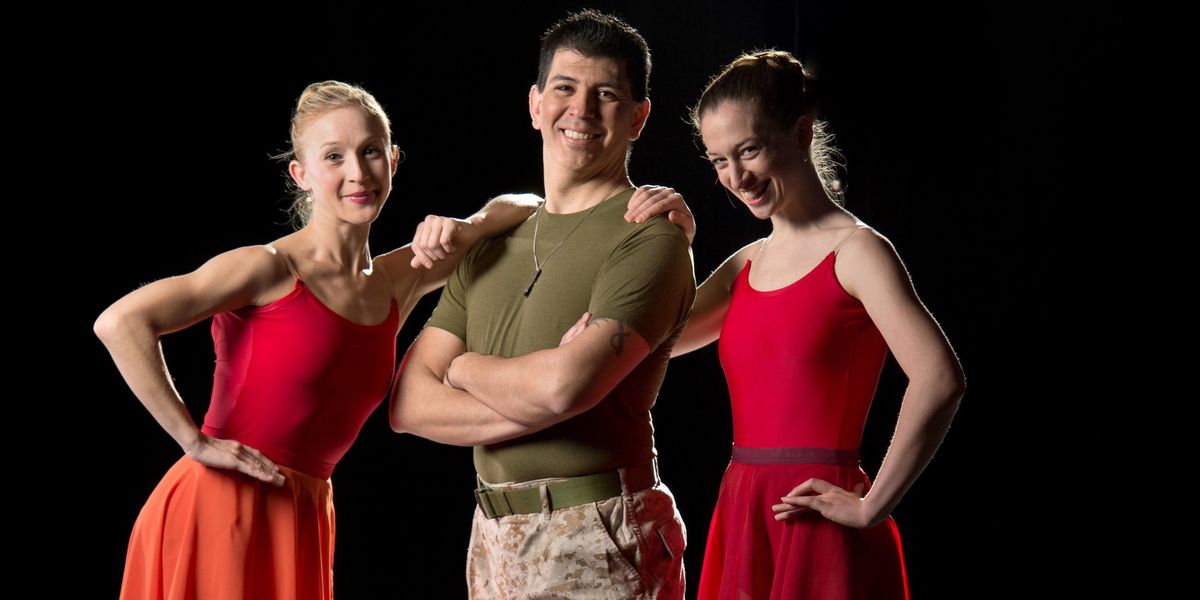This Iraq Veteran Turned Choreographer Is Making Provocative Dances About War
When Roman Baca returned home from active duty in Iraq in 2007, he found himself having a tough time transitioning to civilian life. “I remember a couple of instances where I was mean and angry and depressed,” says Baca. “My wife sat me down and said, ‘You are not the same guy I knew before.’ ” She suggested Baca return to his roots in dance. “She asked me, ‘If you could do anything in the world, what would you do?’ ” Ten years later, Baca seems to be well on his way to answering that question as a Fulbright Fellow in London, working to educate audiences about the realities of war through dance.
But before winning such a prestigious fellowship, Baca had to broker his transition back into dance. Earlier, he had trained at The Nutmeg Ballet Conservatory in Connecticut and spent a few years as a freelance dancer before feeling compelled, like his grandfather had, to serve his country. “I walked into the recruiter’s office and said, ‘I want to help people who can’t help themselves.’ ” Baca reveled in the rigor of the Marine Corps, which seemed like a perfect analog to classical ballet. “I wanted to explore other facets of who I was, and I didn’t want to shirk the challenge of testing my mettle,” says Baca. This was in 2001, shortly before 9/11. “After that happened, we knew there was going to be a response,” remembers Baca. “Our unit was just waiting for its turn.” In 2005, Baca and his unit were deployed to Fallujah.
Baca served as a machine gunner and fire team leader. And while his job was one of looking for insurgents and intelligence, Baca also ended up doing humanitarian work, bringing water and school supplies to those in need. The transition from violence to aid helped him meet his original desire to defend the vulnerable. In 2008, Baca’s contract of enlistment was up and after some debate, he decided to return to civilian life.
Heeding his wife’s advice, upon his return he reached out to his mentor Sharon Dante from The Nutmeg Ballet Conservatory. He had dabbled in choreography before joining the Marines and had begun to write while overseas. Dante suggested it was only natural for Baca to now focus his writing and choreography on his experiences in Iraq. The exploration led Baca to form Exit12 Dance Company, a small troupe with a goal of inspiring conversations about the lasting effects of violence and conflict. Through Exit12, he began to get involved in art and healing for military veterans. Baca has since choreographed a military-themed Nutcracker and created an initiative with New York City’s Intrepid Sea, Air & Space Museum to have Exit12 perform on the aircraft carrier’s deck every Memorial Day.
Through his work with veteran advocacy group Dancing to Connect, Baca co-led a workshop for young people when he returned to Erbil, in northern Iraq. “They told their stories of what it is like to live through war, what they thought of America,” he says. “The trip really solidified my desire to continue to work overseas and share cultures.”
So when a theater in the UK reached out to him in 2016 about creating a new Rite of Spring—one that would explore the connections between the creation of this famous ballet and the outbreak of World War I, in commemoration of the war’s centennial, as well as touch on today’s veterans and current events—he knew immediately it was a project for the Fulbright program.
For the next two years, Baca will be living in London while he pursues his MFA at Trinity Laban Conservatoire of Music & Dance as a Fulbright student. Meanwhile, he will be creating his new Rite as well as continuing to partner with arts organizations that help veterans. With inspiration from several versions of the ballet, from Nijinsky to Pina Bausch to Shen Wei, Baca seeks to make his own mark on the iconic piece. “One percent of our population serves in the military, and an even smaller number serves in war,” explains Baca of one of the central questions motivating this new commission. “How do we take all of this remote and little understood experience and inspire the audience to positive action? I want to motivate them to do something.”




